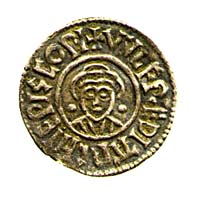March 24, 832: Death of Archbishop Wulfred of Canterbury
 The furious dispute between King Henry II and Thomas a Becket over the relative powers of church and state, which led to the archbishop spending much of his time in France and finally to the murder in the cathedral, was surprisingly similar to the disputes between the kings of Mercia and the archbishops of Canterbury in the late eighth and early ninth centuries. King Offa of Mercia, finding that the archbishop of Canterbury refused to anoint his son as heir to the kingdom, avoided the problem by creating the short-lived third archbishopric of Lichfield (787-802/3). But this had required detailed arguments and Papal support, and the Popes seem later to have thought themselves deceived in Offa's arguments, so it was not a solution that could be applied a second time. Offa's successors would have to clash with Canterbury head on -- and they did.
The furious dispute between King Henry II and Thomas a Becket over the relative powers of church and state, which led to the archbishop spending much of his time in France and finally to the murder in the cathedral, was surprisingly similar to the disputes between the kings of Mercia and the archbishops of Canterbury in the late eighth and early ninth centuries. King Offa of Mercia, finding that the archbishop of Canterbury refused to anoint his son as heir to the kingdom, avoided the problem by creating the short-lived third archbishopric of Lichfield (787-802/3). But this had required detailed arguments and Papal support, and the Popes seem later to have thought themselves deceived in Offa's arguments, so it was not a solution that could be applied a second time. Offa's successors would have to clash with Canterbury head on -- and they did.
Just as Henry and Thomas had the Council of Northampton in 1164, at which Henry brought charges against Thomas and after which the archbishop fled to France for six years, so King Coenwulf of Mercia and Archbishop Wulfred had the Council of Chelsea in 816. Wulfred was fighting for greater ecclesiastical powers, trying to prevent to usual interference by the secular authorities in the appointments of bishops and abbots, and trying to recover the lordship over the abbeys of Reculver and Minster-in-Thanet in Kent, which Offa had treated as his own private property and left to his daughter Cwenthryth.
Wulfred lost. He was forced into exile for as much as six years, though he did make his peace with Coenwulf before the king died in 821. His exile is shown vividly by the coins of Canterbury by moneyers who had minted coins for the archbishop (like the coin pictured here, VVLFREDI ARCHIEPISCOPI): for the next several years, the archbishop's name is missing from his coinage.
Review the history, 787-838.